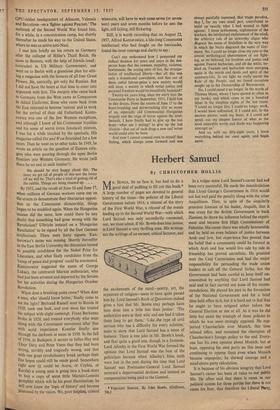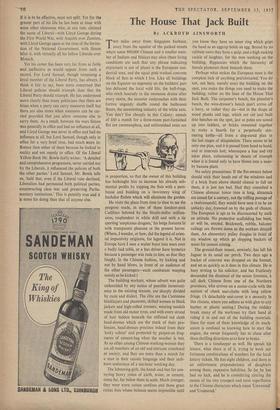Herbert Samuel
By CHRISTOPHER HOLLIS
MR. BOWLE, let us face it, has had to do a good deal of padding to fill out this book.* A large number of pages are devoted to general history of the times—the policies of the Liberal Government before 1914, a résumé of the story of the First World War, a résumé of the events leading up to the Second World War—with which Lord Samuel was only secondarily connected, nor, we must admit, if Mr. Bowle does him justice, is Lord Samuel a very thrilling man. His writings are the writings of an earnest, ethical lecturer, and
the excitements of the mind—poetry, art, the mysteries of religion—seem to have quite passed him by. Lord Samuel's Book of Quotations indeed gives a hint that Mr. Bowle may perhaps have here done him a little less than justice: The authorities were at their wits' end nor had it taken them long to get there,' Like.the type of civil servant who has a difficulty for every solution,' seem to show that Lord Samuel has a sense of humour. There is one joke in Mr. Bowie's book, and that quite a good one, though in a footnote. Lord Allenby in the First World War formed the opinion that Lord Samuel was the best of the politicians because when Allenby's false teeth were lost in the post during the time that Lord Samuel was Postmaster-General Lord Samuel reversed a departmental decision and insisted on compensation being paid to the General.
* VISCOUNT SAMUEL. By John Bowie. (Gollancz, 30s.)
In a vulgar sense Lord Samuel's career had not been very successful. He made the miscalculation that Lloyd George's Government in 1916 would not last and paid the penalty along with the other Asquithians. Then, in spite of the singularly prescient forecast of his leader, Asquith, that it was crazy for the British Government to back Zionism, he threw his influence behind the experi- ment and became first High Commissioner of Palestine. His career there was wholly honourable and he held an even balance of justice between Arab and Jew, but experience has proved that his belief that a community could be formed in which Arab and Jew would live side by side in friendship has proved unrealistic. He presided over the Coal Commission and had the major responsibility for persuading the trade union leaders to call off the General Strike, but the Government had been careful to keep itself un- committed by anything that Lord Samuel had said and in fact carried out none of his recom- mendations. He played his part in the formation of the National Government and for a brief time held office in it, but it is hard not to feel that he ought to have resigned either before the General Election or not at all. As it was he did little but assist the triumph of those policies to which he was most strongly opposed. He sup- ported Chamberlain over Munich, this time refused office, and remained the champion of Chamberlain's foreign policy to the end. Every- one has his own opinion about Munich, but at least, opposing his own party on this issue and continuing to oppose them even when Munich became unpopular, he showed courage and a mind above party calculation.
It is because of his obvious integrity that Lord Samuel's career has been of value to our public life. He often said that there is room in our political system for three parties but there is not room for four, that therefore the Liberal Pithy, if it is to be effective, must not split. Yet for the greater part of his life he has been at issue with some other statesman who, at any rate, claimed the name of Liberal—with Lloyd George during the First World War, with Asquith over Zionism, with Lloyd George again at the time of the forma- tion of the National Government, with Simon lifter it, with virtually all his fellow Liberals over Munich.
Yet his career has been very far from as futile and ineffective as would appear from such a record. For Lord Samuel, though remaining a loyal member of the Liberal Party, has always, I think it fair to say, been more concerned that Liberal policies should triumph than that the Liberal Party should triumph. He has understood more clearly than many politicians that there are times when a party can carry measures itself but there are also times when measures can be car- ried provided that you allow someone else to carry them. As a result, between the wars Simon was generally in office and had no influence at all, and Lloyd George was never in office and had no influence at all, but Lord Samuel, though only in office for a very brief time, had much more in- fluence than either of them because he looked to reality and not merely to office. Of the Liberal Yellow Book Mr. Bowie fairly writes : 'A detailed and comprehensive programme, never carried out by the Liberals, it influenced the policies of both the other parties.' Lord Samuel, Mr. Bowie tells us, 'held that, even if the Liberal vote declined, Liberalism had permeated both political parties, counteracting class war and preserving Parlia- mentary institutions.' This is patently true and it is more his doing than that of anyone else.



































 Previous page
Previous page